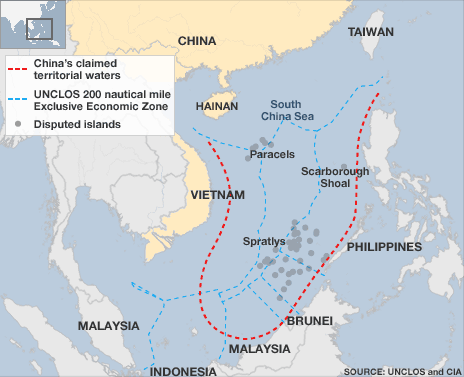
Outline of the contested area of the South China Sea which China has made moves to increasingly control. The US called new fishing rules announced by China “provocative and potentially dangerous.” Source: UNCLOS, CIA via BBC
Who owns the ocean? In reference to the water south of China, it depends on who you ask. Newer claims by China would extend its sovereignty well south to the island of Borneo, passing by Vietnam, Malaysia, and Philippines in the process. Let’s a take a look at what’s gone on and what it says about democracy (or lack thereof) in the region.
Hainan province–closest Chinese territory to the area in question–installed new regulations as of Jan. 1, 2014, stating that any foreign ships wishing to conduct fishing activity in a large portion of the South China Sea (see map for detail) must obtain permission from the Chinese government.
Islands within the regulation zone have been claimed by the aforementioned Vietnam, Malaysia, and Philippines. A statement from the Filipino government says that China is overstepping its bounds, threatening regional stability and raising tensions. From the government of Vietnam: “All foreign activities at these areas without Vietnam’s acceptance are illegal and groundless.”
Taiwan views the regulations as illegitimate. Even the United States has weighed in with an admonishment. On Jan. 9, 2014 State Department spokeswoman Jen Psaki put forth that “The passing of these restrictions on other countries’ fishing activities in disputed portions of the South China Sea is a provocative and potentially dangerous act…China has not offered any explanation or basis under international law for these extensive maritime claims.” (Side note: what exactly is, or should be, the US role in this dust-up? has anyone asked for its help?)
This move comes a few months after China announced an Air Defense Identification Zone in the East China Sea, basically requiring flights through the region to register with the Chinese government; Japan, South Korea, and U.S. military flights have continued undeclared. FPA Blogs’ Scott Monje covered the flight zone controversy last December, click here for more.
There is no easy answer for how to determine who should have rightful control to parts of the ocean, especially when that ocean contains precious natural resources. Many are concerned these new fishing restrictions are just the latest example of China becoming more aggressive in its territorial claims, and could lead to further instability.
At far as I can tell, China has yet to provide any evidence on legal, cultural, historical, sovereign, or any other grounds on why they should control this area of the South China Sea, as opposed to anyone else. All countries should have the right to claim land (err, water) and present a case through accepted legal, democratic channels.
But whether this move is indicative of more general territorial (hegemonic?) aggressionby China remains unclear. It may just be a move to gain access to additional fishery locales. International pressure may cause China to back off. The situation has yet to fully play out.
An equitable resolution ensuring that all nations involved have access to the water and resources of the South China Sea should be the goal for this highly contested territory.